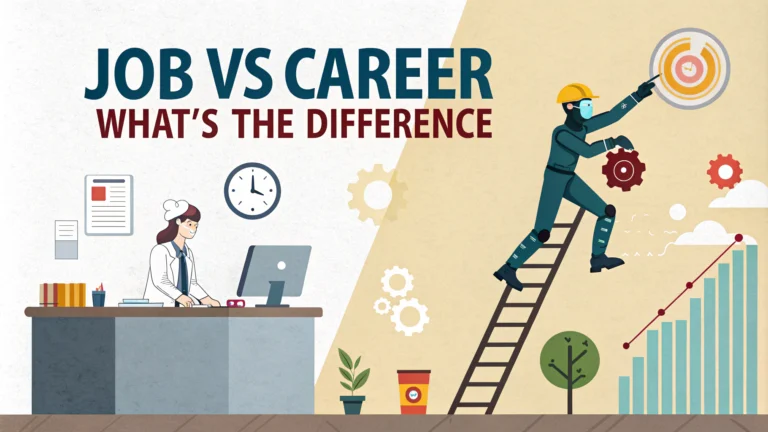Making smart decisions about your professional path starts with understanding the key differences between a **job** and a **career**. While these terms are often used interchangeably, they represent distinct approaches to work and professional growth.
The distinction affects everything from your daily satisfaction to long-term financial stability. A clear understanding helps you make informed choices about your professional development and work-life goals.
Key Differences Between Jobs and Careers
- **Time Focus**: Jobs typically address immediate needs, while careers involve long-term planning
- **Skill Development**: Careers require continuous learning and skill advancement
- **Financial Impact**: Careers often offer greater earning potential over time
- **Personal Investment**: Careers typically demand more emotional and educational investment
Signs You Have a Job Instead of a Career
- Limited connection between current role and future goals
- Minimal professional development opportunities
- Focus mainly on paycheck rather than growth
- Little passion or interest in the industry
Transforming a Job Into a Career
| Action Steps | Expected Outcomes |
|---|---|
| Set professional goals | Clear direction and purpose |
| Pursue relevant certifications | Enhanced qualifications |
| Build industry networks | More opportunities and mentorship |
| Take on additional responsibilities | Expanded skill set |
> “A job is what you do for money; a career is what you do with purpose.”
Building Career Momentum Through Strategic Planning
Success in career development requires clear direction and purposeful action. A well-planned strategy helps transform your current position into meaningful professional growth.
Key Steps for Career Advancement
- Create a **5-year development plan** with specific milestones
- Research industry trends and required skills
- Find mentors in your desired field
- Document achievements and update your portfolio regularly
Balancing Short-Term Income with Long-Term Growth
Making smart financial choices while investing in career development requires careful planning. Consider both immediate needs and future opportunities when making job-related decisions.
Financial Planning Tips
| Income Strategy | Career Investment |
|---|---|
| Build emergency savings | Allocate funds for training |
| Maintain stable income | Consider part-time education |
| Create multiple income streams | Join professional associations |
When to Stay in Your Current Job
Sometimes maintaining your current position makes strategic sense. Look for these indicators before making a change:
- Strong **learning opportunities** exist in your role
- Clear path for internal advancement
- Supportive management team
- Work-life balance meets your needs
- Competitive compensation package
Making Informed Career Decisions
Your professional path should align with both personal values and practical needs. Consider these factors when planning your next move:
Decision-Making Framework
- Assess your current skills and experience
- Research market demand in your field
- Evaluate work environment preferences
- Consider location and lifestyle impact
> “Choose a job you love, and you’ll never have to work a day in your life – but make sure it can support the life you want to live.”
Remember that career development is an ongoing process that requires regular evaluation and adjustment. Focus on making informed decisions that support both your professional growth and personal fulfillment.
Frequently Asked Questions: Job vs Career
What is the main difference between a job and a career?
A job is a short-term position that provides immediate income, while a career is a long-term professional journey with opportunities for growth, advancement, and skill development.
Can a job turn into a career?
Yes, a job can develop into a career when you:
- Gain specialized skills
- Take on increasing responsibilities
- Pursue relevant education or certifications
- Make strategic moves within the industry
What are the financial differences between jobs and careers?
| Jobs | Careers |
|---|---|
| Fixed hourly/weekly pay | Salary increases over time |
| Limited benefits | Comprehensive benefits packages |
| Few advancement opportunities | Regular raises and bonuses |
How do I know if I should stay in my job or pursue a career change?
Consider these factors:
- Long-term professional goals
- Current skill set and interests
- Market demand in desired field
- Required education or training
- Financial implications
What are the signs my job isn’t leading to a career?
Key indicators include:
- No skill development opportunities
- Limited promotion potential
- No clear advancement path
- Stagnant pay
- Lack of industry recognition
Do all careers require a college degree?
No. Many successful career paths don’t require traditional degrees, including:
- Skilled trades
- Technology roles
- Entrepreneurship
- Sales positions
How long does it typically take to establish a career?
Building a career typically takes 3-5 years for initial establishment and 5-10 years for significant advancement. Factors include industry, education, networking, and personal effort.
What’s the difference between career growth and job hopping?
Career growth involves strategic moves every 2-4 years with clear progression, while job hopping typically means changing positions every 6-12 months without clear direction.
How can I turn my current job skills into a career path?
Strategic steps include:
- Identifying transferable skills
- Taking relevant certifications
- Building professional networks
- Creating a career development plan
- Finding mentors in desired field
What industries offer the fastest path from job to career?
Fast-track industries include:
- Technology and IT
- Healthcare
- Digital Marketing
- Project Management
- Data Analytics



















